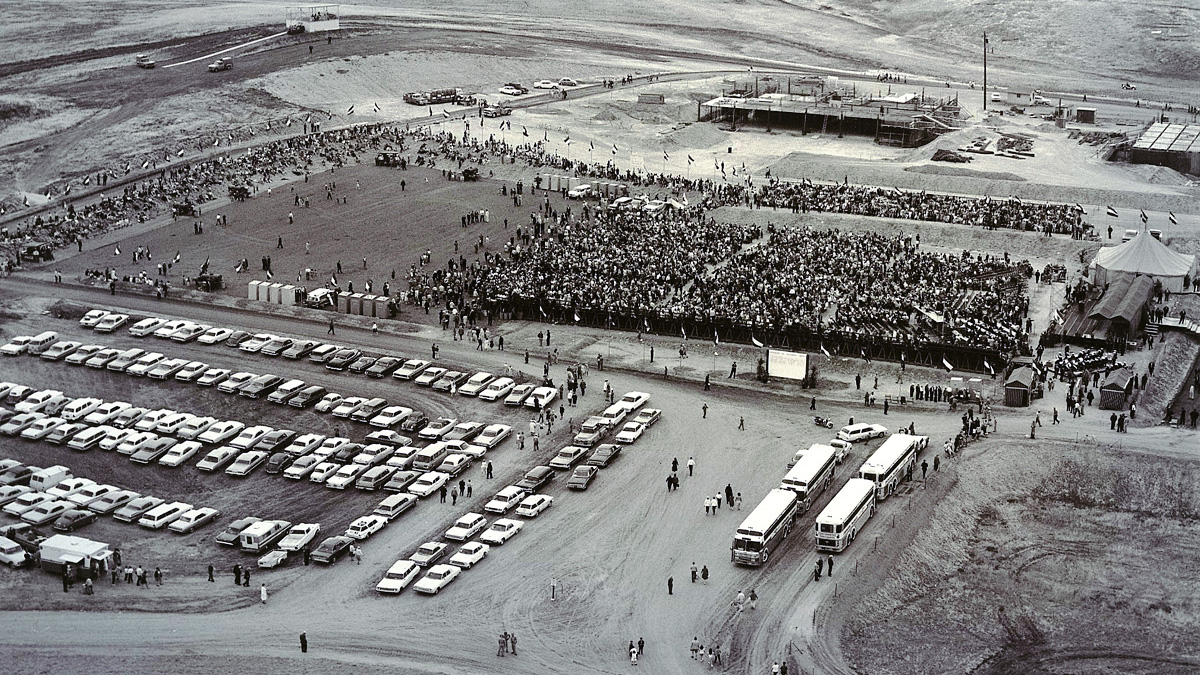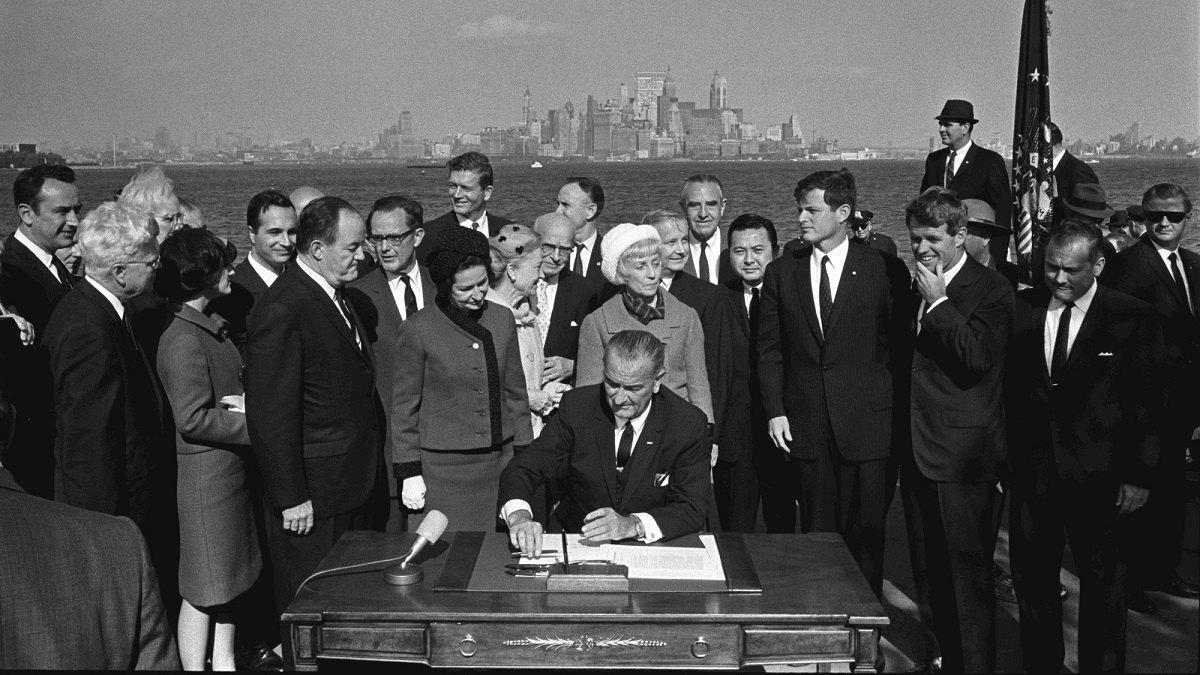About the Conference
Transforming Migrations: Beyond the 1965 Immigration Act
Inaugural event in UCI's 50th Anniversary Academic Symposium Series

Come Join Us
Two Groundbreakings: A Prologue
On June 14, 2014, President Barack Obama spoke at UCI's commencement ceremony, landing by helicopter to kick off the campus's 50th anniversary celebration, addressing an extraordinarily diverse class of which nearly half were first-generation university graduates.
Fifty years earlier almost to the day, on June 20, 1964, President Lyndon B. Johnson had presided over UCI's groundbreaking ceremony, also landing by helicopter but in a barren pasture to dedicate the land that would become UC Irvine, the 8th campus of the University of California. The first buildings remained months away from completion, and students would not arrive for another fifteen months. “I have come to California to ask you to throw off your doubts about America,” from the podium President Johnson exhorted the crowd of some 15,000 strong. “Help us demonstrate to the world that people of compassion and commitment can free their fellow citizens from the bonds of injustice, the prisons of poverty and the chains of ignorance.” Johnson had only recently unveiled his Great Society agenda and in a matter of days would sign groundbreaking civil rights legislation. That landmark Civil Rights Act of 1964 sought to usher in a Great Inclusion after a century of Jim Crow: the most sweeping such legislation since Reconstruction, it prohibited racial discrimination in employment and education and outlawed segregation in public facilities.

Completing a historic circle half a century later, the nation’s first Black president told thousands of graduating UCI students:
"In your young lives, you’ve seen dizzying change, from terror attacks to economic turmoil; from Twitter to Tumblr. Some of your families have known tough times during the course of the worst economic crisis since the Great Depression.. . . And yet, your generation -- the most educated, the most diverse, the most tolerant, the most politically independent and the most digitally fluent in our history -- is also on record as being the most optimistic about our future… you’re the antidote to cynicism… Cynicism has never won a war, or cured a disease, or started a business, or fed a young mind, or sent men into space. Cynicism is a choice. Hope is a better choice… Hope is what gave young students the strength to sit in and stand up and march for women’s rights, and civil rights, and voting rights, and gay rights, and immigration rights. Hope is the belief, against all evidence to the contrary, that there are better days ahead, and that together we can build up a middle class, and reshape our immigration system... Hope is the fact that, today, the single largest age group in America is 22 years old who are all just itching to reshape this country and reshape the world. And I cannot wait to see what you do tomorrow…"
From the Great Inclusion to the Great Expulsion
On October 4, 1965, UCI began campus operations… with 1,589 students, 241 staff, 119 faculty, and 43 teaching assistants. Just the day before, on October 3, 1965, President Johnson had signed into law the Immigration and Nationality Act of 1965 in a ceremony at the foot of the Statue of Liberty. Against that dramatically symbolic backdrop, he said: "This [old] system violates the basic principle of American democracy, the principle that values and rewards each man on the basis of his merit as a man. It has been un-American in the highest sense, because it has been untrue to the faith that brought thousands to these shores even before we were a country." The 1965 act marked a radical break from the immigration policies of the past. The law as it stood excluded Asians and Africans and preferred northern and western Europeans to southern and eastern ones. At the height of the civil rights movement, such exclusionary policy was considered an embarrassment by, among others, President John F. Kennedy, who called the then-quota-system "nearly intolerable." A year after the passage of the Civil Rights Act, this law too sought the removal of racist barriers and a Great Inclusion with respect to immigration.

Its proponents at the time assured that passage would not significantly influence the country’s demographic mix or culture. President Johnson called the bill "not a revolutionary bill. It does not affect the lives of millions.” Such an assertion would later prove grossly inaccurate. In fact the law marked a radical break with previous policy and led to profound socio-demographic changes in the United States, California… and what became UC Irvine.
More immigrants come to the United States than to any other country in the world. The United States is home for a fifth of the world’s migrant population. After five decades of accelerating migration flows, well over 40 million foreign-born persons now live in the United States; they hail primarily from Latin America and Asia—quite the opposite of predictions at the time the 1965 bill became law. They come from varied national and class origins—including refugees, professionals, entrepreneurs, and unauthorized laborers. Indeed, more than 11 million immigrants (over a quarter of the foreign-born population) are undocumented, and the subject of systematic and intensifying state persecution—a Great Expulsion—especially after 9/11 and the establishment of a huge federal detention and deportation apparatus.
Meanwhile, a new U.S.-born second generation has grown rapidly and now totals well over 30 million, so that immigrants and their children today comprise nearly a quarter of the national population—and half of all Californians. The new immigration has transformed the ethnic composition of the United States, sprouting ethnic "majority-minority" cities, counties, and states (California in 2000, Texas in 2009)—as the nation itself will become within a generation.
California is home for more than a one-fourth of all immigrants in the United States, and more than a fourth of the state's population is foreign-born—a significantly greater proportion than any other state. And southern California is home to the largest concentrations of Mexicans, Salvadorans, Guatemalans, Filipinos, Koreans, Japanese, Taiwanese, Vietnamese, Cambodians, Iranians, and other nationalities found outside of their respective countries of origin, and to sizable contingents of others, such as the Armenians, mainland Chinese, Hondurans, Indians, Laotians, Russian and Israelis, and several Arab nationalities. Indeed, most of the largest immigrant nationalities that have settled in the United States since the 1960s—including the largest concentrations of refugees and of immigrant professionals, entrepreneurs, and unauthorized laborers—have established their primary settlements in greater Los Angeles (including Orange County).
To mark the 50th anniversary of the signing of the Immigration Act of 1965—we have organized a major conference in October 2015 to reflect on the myriad changes that have occurred in that span of half a century with respect to international migration to the United States: its rapidly changing size and composition over time, its concentration in new (and old) destinations, and its profound demographic, social, cultural, economic and political changes, and finally, its implications for an uncertain future.
To that end, the symposium will open with an evening event at the Beckman Center, bringing two high profile journalists to take stock of "Reason and Hyperbole in the National Immigration Debate Today." That evening event will feature welcome speeches from campus leaders as well as a brief overview of the deep, if unanticipated, that have transformed the country and the region—and indeed, the composition of a university like UCI, situated in the very center of the world’s premier immigrant metropole. The evening event will then be followed by a full day of sessions on campus, organized thematically from "The Past is Ever Present" to "The Future is Ever Present." Details of those sessions are provided here, along with the confirmed participants—drawn from among the most prominent scholars from different disciplines as well as leading activists. While we cannot predict what new changes may lay ahead, one prediction seems certain: immigration a year hence will remain a white-hot issue of political and policy concern. The conference—the inaugural event in UCI's 50th Anniversary Academic Symposium Series—aims to provide a critical lens for making sense of one of the most complex and controversial issues of our time.
